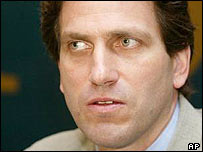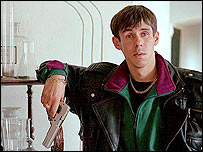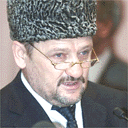
The mystery of Litvinenko's death
By Tom Geoghegan
BBC News
The death bed statement by Alexander Litvinenko blamed Russian President Vladimir Putin for the poison he believes took his life. But will we ever know with certainty who was responsible?
As the speculation about what poisoned Mr Litvinenko comes to an end with the announcement that radioactive substance polonium-210 was probably to blame, the question of who was responsible persists.
The former spy's two meetings in central London on 1 November, in Piccadilly and Mayfair, may hold the key to the identity of his killer.
Alexander Litvinenko
The former KGB agent made enemies
Friends of the 43-year-old have blamed the Russian security service (FSB), as Mr Litvinenko accused it of many abuses, including the bombing of several apartment blocks in Russia in 1999, which killed 300 people.
Others had linked his sickness directly to another focus of his criticisms, former KGB agent Putin.
Any involvement has been dismissed by the Kremlin as "nonsense", a sentiment echoed by Russia's foreign intelligence service.
The matter is now in the hands of Scotland Yard, which is investigating the case as an "unexplained death".
Security analyst Glenmore Trenear-Harvey, who met Mr Litvinenko several times, said the media focus on the Kremlin was "lazy" and bore the hallmarks of a John Le Carre novel.
"We have to put this in a historical context," he said.
"Litvinenko's last job within the FSB was heading up the anti-corruption unit and he discovered a lot of corruption there and made a lot of enemies within the KGB."
When Yeltsin broke the KGB into different agencies such as the FSB and the SVR, the majority of its members stayed on but some went into the Duma and a third group went into legitimate business, he said.
But a "murky bunch" went into what was known as the Russian mafia.

Chechens freed in Forbes killing
Paul Klebnikov
Klebnikov was shot in a Moscow street in July 2004
A Moscow court has acquitted two Chechen men of murdering American journalist Paul Klebnikov.
Klebnikov was editor of the Russian edition of Forbes business magazine, which had tackled the issue of corruption in Russia's powerful elite.
He was shot dead in what appeared to be a contract killing as he left his Moscow office in July 2004.
Prosecutors had alleged that the two men carried out the killing on behalf of a former Chechen rebel leader.
They said fugitive Khozh-Akhmed Nukhayev, who had featured in a book Klebnikov had written, had paid a criminal gang to kill him.
But a jury at the Moscow City Court voted to acquit Kazbek Dukuzov, 32, and Musa Vakhayev, 42, who were both charged with the actual shooting death of Klebnikov.
A third suspect, Fail Sadretdinov, faced charges of attempted murder in a separate case and organising the gang alleged to have killed the journalist. He was also acquitted.
The men had denied the charges against them.
'Not satisfied'
The trial began in January and took place behind closed doors.
Relatives of the men cheered and applauded at the acquittal. Outside the court, Mr Dukuzov said he was "grateful to the entire Russian people".
Klebnikov's family said in a statement that it respected the outcome of the trial, but urged the Russian government to continue its investigation "with renewed vigour".
"We will not be satisfied until justice is served and the individual or individuals who ordered Paul's killing are found out and brought to trial," Klebnikov's brother Michael said.
Prosecutor Dmitry Shokin said the state might appeal against the verdict.
Klebnikov's death caused an international outcry and led to speculation that it might have been linked to investigations he was involved in regarding the Russian business world.
A New Yorker of Russian origin, Klebnikov had worked for Forbes for more than 13 years. The Russian edition of the magazine had been launched earlier in 2004.
It had published a list of the country's wealthiest people and claimed that Moscow had more billionaires than any other city in the world.

The killing of journalist Anna Politkovskaya bore the hallmarks of a contract killing, according to anonymous police sources interviewed by Russian media.
Russian actor Alexei Panin in the hitmen film Zhmurki (image: CTB film company website)
Russian films like Zhmurki have captured the world of the hitmen
The hitman or killer (pronounced "keeler" in Russian) is a phenomenon of the country's shock transition from communism to a market economy.
You would use the Russian verb zakazat' to order a pizza or a plane ticket but when you "order someone", in the popular parlance, it means you want them killed by one of these hired hitmen.
If Russian media accounts are to be believed, his wages can range from a modest $100 to sums running into the hundreds of thousands of dollars, depending on the target.
When Ms Politkovskaya was shot at her home, there did not appear to be any attempt at robbery and the presumed weapon, a Makarov pistol, was left at the scene together with its used cartridges.
When Russian television broadcast CCTV footage from the apartment block entrance, it showed the chief suspect to be a thin man in a baseball cap, his face a blur.
If this was a contract killing, identifying the perpetrator - and those behind him - will be difficult.
Open season
One of my memories of Moscow in the winter of 1996 was passing a set of bullet-holes in a subway on my way to work.
SUSPECTED CONTRACT KILLINGS
The late Anna Politkovskaya
October 2006 - campaigning Russian journalist Anna Politkovskaya shot dead in Moscow
Sept 2006 - first deputy chairman of Russia's central bank Andrei Kozlov shot dead in Moscow
Oct 2005 - former bank head Alexander Slesarev gunned down near Moscow
July 2004 - US editor of Forbes' Russian edition Paul Klebnikov shot dead in Moscow
Oct 2002 - Magadan governor Valentin Tsvetkov killed in Moscow
Nov 1998 - liberal MP Galina Starovoitova killed in St Petersburg
March 1995 - leading journalist Vladislav Listyev shot dead in Moscow
Nobody seemed in a rush to fix the chipped tiles, just a short distance from a luxury hotel.
For those who knew, the holes marked the spot where US businessman Paul Tatum was machine-gunned to death.
The chief lesson from his unsolved death appeared to be that prominent foreigners could be targets too.
The death of much-loved TV anchorman Vlad Listyev the previous year had already established that fame was no protection from the hired guns.
A wave of contract killings washed through Russia in the 1990s, sweeping away new bankers and businessmen.
With the security apparatus in freefall and war raging in the Caucasus, the country seemed awash with guns. Another memory for me is descending an empty escalator in a metro station beside Red Square one night and seeing one "wide boy" slapping another on his knees as he held a pistol to his head.
By the early years of this century - with Vladimir Putin in power - the wave seemed to be receding.
And then came the murder of another American, Forbes journalist Paul Klebnikov, in 2004 and, this September, deputy head of the Central Bank Andrei Kozlov.
Both were shot dead - Klebnikov outside his office, Kozlov in his car.
Nobody has ever been convicted of their murders despite hopes for a while that the Klebnikov case would be solved.
But while "unsolved" is a word you associate almost automatically with contract killings in Russia, occasionally a killer is caught.
1990s survivors
Alexander Solonik, aka Alexander The Great, aka superkiller, confessed to assassinating a string of Moscow underworld figures in the early 1990s without, it is said, revealing his paymasters.
CCTV image of the suspected killer broadcast by Russia's NTV channel
The killer of Politkovskaya appears to have been caught on CCTV
He also cut a bloody swathe through the capital's police force before his arrest in 1994.
Solonik's main "qualifications" for the work of a hired killer appear to have been a period of military service, an early spell in prison, good physical fitness and a reputed ability to shoot with both hands.
Escaping from Moscow's famous Matrosskaya Tishina (Sailor's Rest) prison in 1995, he fled abroad only to be murdered along with his girl-friend in Greece a couple of years later.
Russian film director Alexei Balabanov's 2005 black comedy Zhmurki (Blind Man's Buff), about hitmen, begins in a morgue where some fresh corpses are soon added to the display.
Sub-titled "For those who survived the '90s", it struck a popular chord, capturing a grotesque world of casual killers, rapacious New Russians and cowed police.
There may be fewer raspberry-red blazers and long leather jackets in Moscow today, and the city now teems with hard-faced police, but it seems the phenomenon of the killer survived the '90s too.

Chechnya - Land of the warlords
The country's rogue prime minister Ramzan Kadyrov, 29, who wields a private army and loves boxing, is facing armed opposition from rival pro-Russian factions. Nick Paton Walsh reports
Nick Paton Walsh, Grozny
Tuesday June 13, 2006
Guardian Unlimited
Akhmad Kadyrov
Akmad Kadyrov, the Chechen president assassinated in 2004. His son Ramzan, the prime minister, wants the post. Photograph: AP
In the end, there are perhaps just a few lengths of piping between Chechnya and a new civil war. It was late one night last month, and one of the tearaway relatives of Chechen prime minister Ramzan Kadyrov was driving out of the war-torn republic a truckload of oil pipework for sale on the black market in southern Russia.
Yet his family connections to Chechnya's de facto boss, the 29-year-old thuggish prime minister who rules the republic with a private army, were no free pass out of the republic. In order to cross the border he had to pass the stronghold of a rival warlord, Movladi Baysarov, a colonel in the Russian security services, the FSB. Baysarov's men stopped the truck and began asking questions, prompting their light-fingered new owner to ring his powerful relative, Ramzan.
Article continues
"One of Kadyrov's deputies got together a thousand men and encircled Baysarov's stronghold to disarm him," said Rashid, a soldier in an armed unit loyal to Kadyrov who did not want to be identified. The incident soon gained a life of its own, exposing the deep rifts that Kadyrov's meteoric rise has created between the rival factions of pro-Russian Chechen warlords who today control the republic for Moscow.
"Baysarov ordered his men not to be the first to shoot, as he didn't want Chechens killing Chechens", said Rashid. "They came out and told Kadyrov's men that they were only 50 strong but ready to die like honest Muslims if it came to it."
The standoff could have ended in bloodshed and perhaps further conflict were it not for the president of Chechnya, Kadyrov's boss Alu Alkhanov, and another Chechen warlord, Said Magomed Kakiev, swinging in behind Baysarov and his men. They telephoned Kadyrov, forcing him to withdraw his troops.
Growing tension between the rival Chechen warlords who now hold sway in the republic is being fuelled by the presidential ambitions of prime minister Kadyrov. He turns 30 in October, the minimum age under the constitution for the top post of president, held by his father, Akhmad, until his assassination in May 2004.
"Ramzan wants to become a god in the republic," said Rashid. "Any group that does not obey him completely is deemed illegal."
Moscow has since 2003 slowly handed control of the republic to loyal Chechens in a bid to reduce troop numbers and wash its hands of a conflict it reignited through its second invasion of Chechnya over six years ago. Yet the growing power struggle between pro-Moscow Chechens threatens this withdrawal and erratic improvements to daily life, such as some better roads, running water and a drop in the number of abductions.
Kadyrov's presidential ambitions are obstructed by more experienced pro-Moscow Chechen commanders who head battalions of war-hardened mercenaries, some of whom gave rare interviews to the Guardian. They object to the inexperience and crude style of the young premier, a boxing fan who backs polygamy, has a pet lion and is friends with Mike Tyson.
Zair, the assumed name of a senior officer in one of Kadyrov's units, said: "They'll all go against Ramzan if he picks a fight. Any provocation and it could all go off."
Another incident in the last month helped expose these simmering rivalries. On April 25 Kadyrov attended a meeting with Alkhanov and a senior Kremlin official at the presidential administration. Alkhanov's security team would not allow Kadyrov's bodyguards into the building, so Kadyrov's security chief hit his counterpart in the face.
"There was a lot of shooting, mostly in the air," said Zair. "Alkhanov rang for the help of Said Magomed Kakiev", the powerful head of the "West" battalion of 900 Chechen fighters under the control of Russian military intelligence, the GRU. Rashid added: "When Kakiev got there, Kadyrov's lot left, saying they'd be back in 20 minutes. They never returned". At least three men were wounded in the exchange of fire, some reports suggesting two died.
Zair said Kadyrov then gathered senior MPs and put pressure on Alkhanov to claim he was seriously ill and resign in October. Anxious to prevent open conflict, Russian president Vladimir Putin summoned Alkhanov and Kadyrov to Moscow for a carpeting. Alkhanov returned to Grozny and told the Interfax news agency he was the elected president and would remain so. Yet Kadyrov retains his ambitions, many accusing him of being behind a poll recently circulated among Grozny residents asking whether he or Alkhanov was behind recent improvements in the capital.
Zair said Alkhanov has gained the support of not only Kakiev but Sulim Yamadayev, the head of the "East" battalion, 800 hardened special forces Chechens also under the control of the GRU. He said Yamadayev's men got into a shoot-out with Kadyrov's people 15 days ago in which up to three people were injured.
Alkhanov is also backed by Baysarov, a former confidant of Kadyrov's father. Baysarov has been declared an "outlaw" by Ramzan yet retains a unit of 50 men just outside Grozny, reportedly protected by the FSB. Baysarov is said to be broadly respected by Chechen commanders, as was highlighted by the recent conflict with Kadyrov's men.
Zair and Rashid, both mercenaries under Kadyrov's control, said they disliked the cult of personality Kadyrov was creating by putting up posters of himself around Grozny. They both said they would refuse to fight and stay at home if Kadyrov took on Baysarov. "Ramzan hardly speaks Russian at all," said Zair, in disdain at his poor education.
Amid the infighting, the threat posed by Islamic separatist militants led by Beslan mastermind Shamil Basayev has become a distraction. "We're too busy fighting amongst ourselves to care about the militants," said Zair. Yet the constant realignment of mercenaries under Kadyrov's control has raised fears militant numbers may grow.
Kadyrov was recently forced to disband the Anti-Terrorist Centre (ATS), a group of former militants on his payroll, after they were accused of repeated abuses and separatist sympathies. Zair and Rashid said one ATS commander, known as Mullah, had been caught feeding information to the separatists. "Ramzan ordered that his entire family be wiped out," they said.
Rashid said that only a fifth of the 10,000 hired guns in the ATS had been given new jobs in Kadyrov's forces, leaving 8,000 mercenaries without work. "Maybe some will stay at home, maybe some will join the militants," he said.
* Who's who in the new Chechnya: Ramzan Kadyrov: PM with presidential ambitions. Controls "North" and "South" interior ministry units and thousands of other mercenaries.
* Alu Alkhanov: president under threat from Kadyrov. Respected by senior pro-Moscow Chechens.
* Movladi Baysarov: has unit of 50 men, widely respected yet disliked by Kadyrov. Protected by FSB.
* Sulim Yamadayev: heads 1000 strong East battalion, controlled by the chief intelligence directorate (GRU) of the Russian military. Dislikes Kadyrov.
* Said Magomed Kakiev: commander of 900-strong "West" battalion, also under GRU control. Dislikes Kadyrov.
* Adam Delimkhanov: top deputy to Kadyrov, and his successor if Kadyrov is killed. Controls "North" unit and the "Neftepolk" elite troops that protect the oil system.

No comments:
Post a Comment